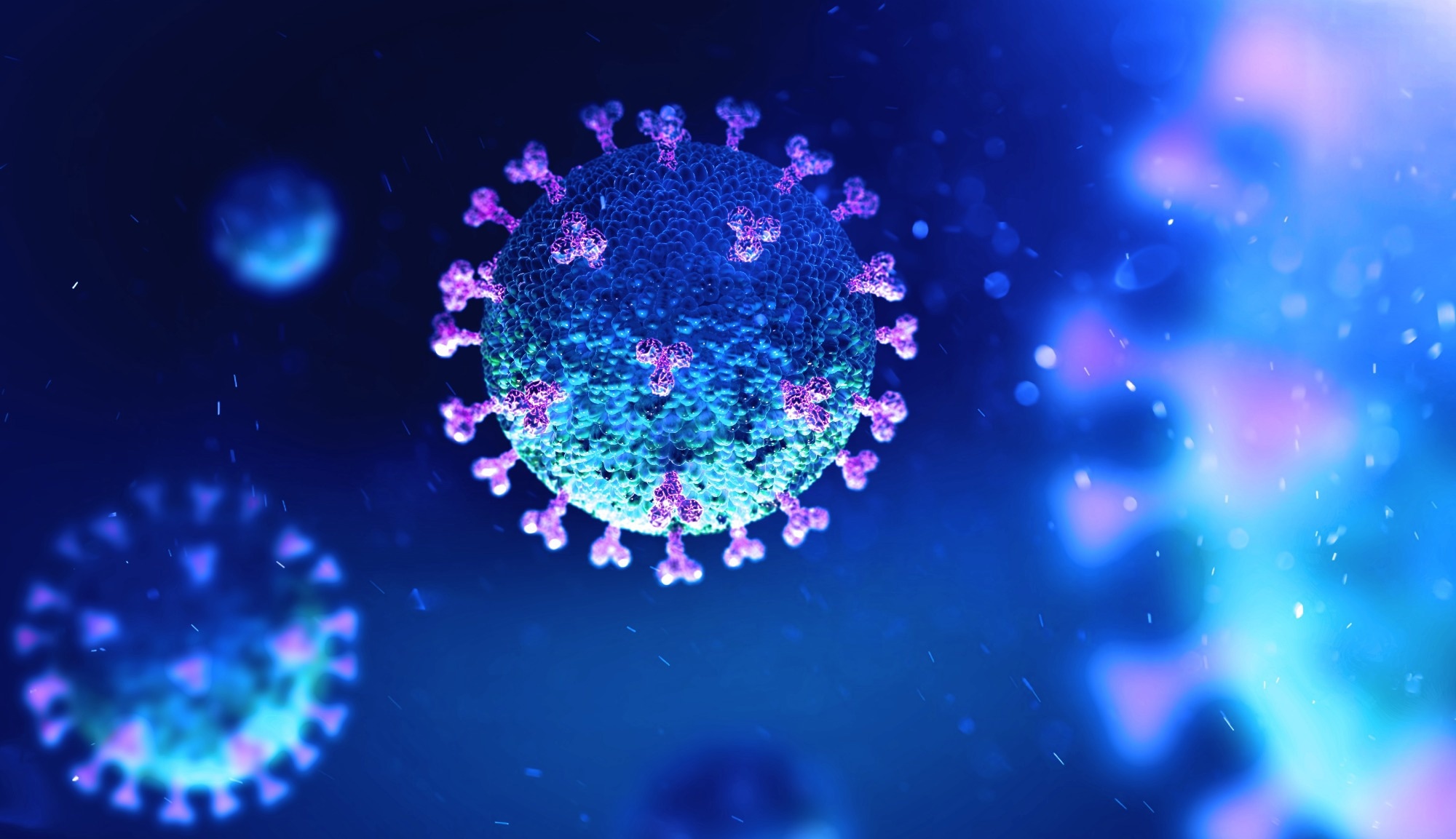They used a classical workflow, where an artificial intelligence (AI)-based prediction tool enabled rapid selection of antibodies binding different regions (epitopes) of the SARS-CoV-2 receptor-binding domain (RBD).
Subsequently, they performed biolayer interferometry (BLI), mutational screening, and cryogenic-electron microscopy (cryo-EM) analyses to establish their potency in vivo (in female Syrian hamsters).
 Study: Integrating artificial intelligence-based epitope prediction in a SARS-CoV-2 antibody discovery pipeline: caution is warranted. Image Credit: Andrii Vodolazhskyi/Shutterstock.com
Study: Integrating artificial intelligence-based epitope prediction in a SARS-CoV-2 antibody discovery pipeline: caution is warranted. Image Credit: Andrii Vodolazhskyi/Shutterstock.com
Background
Early during the SARS-CoV-2 pandemic, the rollout of potent vaccines against coronavirus disease 2019 (COVID-19) was uncertain, but therapeutic antibodies showed great promise. However, most emerging SARS-CoV-2 mutant strains were resistant to these nABs.
Thus, developing SARS-CoV-2-nAB cocktails targeting non-overlapping epitopes of its spike (S) receptor-binding domain (RBD) and their preclinical selection remains crucial.
Numerous studies published between 2013 and 2023 have described computational methods for sequence-based antibody modeling; however, experimental validation of these is lacking.
About the study
In the present study, researchers first established a library of anti-SARS-CoV-2 nABs for passive immunization of patients with varying COVID-19 severities.
Next, they used a surrogate neutralization assay for screening SARS-CoV-2 neutralizing activity in serum samples collected from these patients.
Based on assay results and the availability of adequate peripheral blood mononuclear cells (PBMCs), the team selected 14 patients for further investigation, wherein they sorted out B-cells binding the SARS-CoV-2 RBD using a B cell mining platform adapted from previously established methods.
Then, they sequenced 398 paired light and heavy chain AB sequences from 1,069 viable B-cells. This approach was unique because it employed an additional MAbSilico AI-based method early in the workflow to generate a similarity matrix between the 398 AB epitope sequences.
Enzyme-linked immunosorbent assay (ELISA) showed that 249 of these 398 Abs bound the SARS-CoV-2 S1 protein, and 188 ABs could decimate vesicular stomatitis virus(VSV)-based pseudotyped viruses with Wuhan SARS-CoV-2 S.
Based on the evidence from these analyses, two antibodies, UZGENT_A3 and UZGENT_A5, underwent further antibody epitope characterization and in vitro evaluations to establish potency against Wuhan SARS-CoV-2.
The team also evaluated the therapeutic potential of UZGENT_A3 and UZGENT_G5 in a hamster model.
The team used MAbTope, a docking-based method, for in-depth epitope mapping, where AI-optimized scoring functions ranked docking poses.
The number of residues in the interface in the top-ranked docking poses helped identify paratope-epitope interaction regions.
They used BLI to establish their epitope binding against the REGN-COV2 cocktail comprising REGN10933 (casirivimab) and REGN10987 (imdevimab) and cryo-EM to study the paratope-epitope interactions of UZGENT_A3 and UZ_GENT_G5 with the SARS-CoV-2 S protein.
Results
The affinities of UZGENT_A3 and UZGENT_G5 for the Wuhan SARS-CoV-2 RBD exceeded that of the commercially available REGN-COV2 cocktail, with an apparent affinity of UZGENT_G5 being over 40-fold higher. UZGENT_A3 and UZGENT_G5 competed with REGN10933 and each other.
UZGENT-COV2, a cocktail of UZGENT_A3 and UZGENT_G5, markedly reduced viral load compared to a placebo group.
It also exhibited high therapeutic efficacy in vivo but had slightly lower efficacy than the REGN-COV2 cocktail.
However, UZGENT-COV2 lost effectivity against several variants of concern (VOCs) of SARS-CoV-2, including Beta and Omicron variants, especially B.1.351 and B.1.1.529 with mutations in E484K and E484 residues but not the Delta variant.
Despite not being identified as significant in in silico epitope predictions, residue 484/485 was crucial for binding UZGENT_A3 and UZGENT_G5 antibodies, indicating partially overlapping epitopes.
While mutation K417N had little impact on neutralization, the K417N and E484K mutants showed decreased neutralization, and the L452R mutation had no effect.
The actual epitope footprint of UZGENT_A3 and UZGENT_G5 is likely to include more residues than identified by the assay used in this study; however, it only detected strong contributors to the interaction and no residues outside the RBD or in quaternary structures.
The levels of UZGENT-COV2 antibodies were lower in hamsters compared to the isotype control and REGN-COV-2, suggesting that modifying their fragment crystallizable (Fc) region could improve virus neutralization or extend their half-life.
In cryo-EM analyses, UZGENT_A3 and UZGENT_G5 antibodies showed the same binding pose and epitope, with glycosylated asparagine at position 59 contributing to the epitope/paratope interaction surface, suggesting glycosylation may not be a contributing factor in antibody binding affinity.
Conclusions
The study highlighted that AI-based tools for de novo predictions of paratope-epitope interactions for SARS-CoV-2-nABs lacked accuracy; thus, while they identified a potent antibody cocktail comprising UZGENTG5 and UZGENTA3 antibodies, predicted epitope regions were incorrect.
Thus, there is a need for experimental validation to improve the accuracy of these AI-based methods. Experimental validation also remains crucial for successful nAB lead selection.